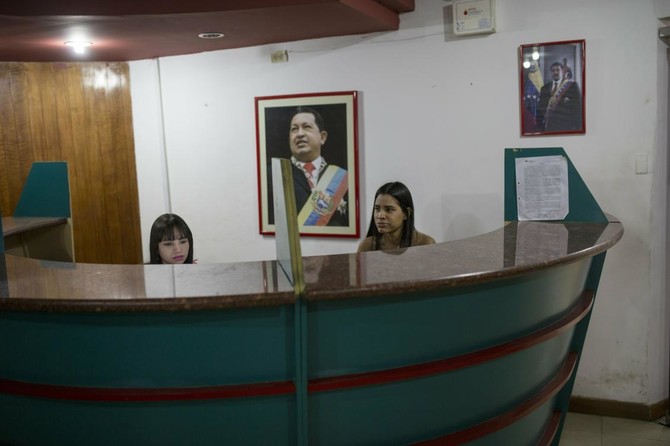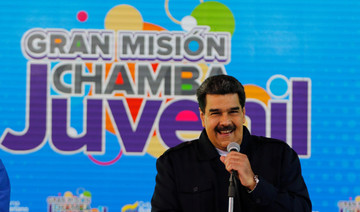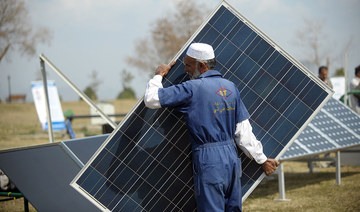CARACAS: Venezuela devalued its currency by almost 35 percent on Monday to bring it into line with the exchange rate of the dollar on the black market.
The exchange rate is now fixed at 3,200 bolivars to the dollar, almost matching the 3,118.62 offered on the dolartoday.com site that acts as the reference for the black market.
Exchanges will now be provided by a technological platform operated by a private firm called Interbanex, which said it would operate a “supply and demand” exchange.
The announcement represents a huge about-turn by the socialist regime of Nicolas Maduro, which has imposed strict currency controls since 2003, all the while monopolizing foreign reserves.
That forced individuals and businesses to turn to the black market to get dollars — a necessity in a country wracked by an economic crisis marked by hyperinflation and shortages of basic necessities.
However, the black market rate for the dollar was 30 times the official rate, as the government artificially overvalued the bolivar.
Specialists have urged Maduro to abandon the policy of controlling exchange rates in order to combat the country’s economic crisis and inflation, which the International Monetary Fund says will reach 10 million percent this year.
The move comes at a time when Venezuela is also mired in a political crisis after parliament head Juan Guaido declared himself “acting president” last week.
Guaido was recognized as the legitimate interim president by a number of countries, including the United States, which has slapped tough economic sanctions on the Maduro regime.
Maduro has accused the US and Guaido of attempting to engineer a coup d’etat.
Consultant Asdrubal Oliveros, director of Ecoanalitica, says currency move has come too late.
“With the dynamic the country is in, this isn’t viable and it will make things worse,” he said.
In August, Maduro launched a series of economic reforms including devaluing the bolivar by 96 percent, but since then it has lost another 98 percent of its value.
Venezuela devalues currency to align it with black market
Venezuela devalues currency to align it with black market

- The announcement represents a huge about-turn by the socialist regime of Nicolas Maduro, which has imposed strict currency controls since 2003
- Opposition leader Juan Guaido has been recognized as the legitimate interim president by a number of countries, including the United States
Saudi Arabia to launch $10bn Aramco share offer: Bloomberg

RIYADH: Saudi Arabia is set to formally launch the debut of Aramco’s secondary share offering, potentially exceeding $10 billion.
According to Bloomberg, citing individuals familiar with the matter, the debut is set to launch on June 2, representing one of the largest deals in recent years.
As per sources, the government plans to conduct a book-building process on June 6. Informal investor interest from the Middle East and Europe is expected to exceed $10 billion.
The offering is the culmination of a years-long effort to sell another chunk in one of the world's most valuable companies after its record-setting IPO in 2019 that raised $29.4 billion.
The company bolstered dividends to almost $98 billion in 2023 from the $75 billion it had been paying annually, despite profit having dropped by nearly a quarter. It expects an outlay of $124.3 billion this year.
Aramco has also invested in refineries and petrochemical projects in China and elsewhere, expanded its retail and trading businesses, and sharpened its focus on gas, making its first foray into liquefied natural gas abroad last year.
Aramco introduced a special performance-based dividend last year, providing cash to the kingdom and helping to lure new investors. It offered $31 billion in dividends for the first quarter, a 59 percent boost from the first three months of 2023 even as profit declined 14 percent in the same period.
The company has also signed up more banks as market-makers to help improve liquidity in the shares.
Aramco currently produces about 9 million barrels of crude a day, about three quarters of its maximum capacity, to comply with output cuts agreed by OPEC and its allies, known as OPEC+.
OPEC+ is set to decide its next production policies on Sunday, and several sources and analysts expect the meeting to roll over existing cuts into the second half of 2024.
Saudi Arabia leads Middle East’s solar revolution as region eyes renewable future

RIYADH: Saudi Arabia has achieved a world-record low levelized cost of electricity for solar photovoltaics, reaching $10.4 per megawatt-hour, according to a new report.
A recent analysis by Norwegian business intelligence and research company Rystad Energy indicated that along with the UAE and Oman, the Kingdom is poised to lead the Middle East’s solar transition due to several key factors.
The report highlighted the increasing significance of solar power in the energy policies of Middle Eastern countries, attributing this trend to factors such as low hurdle rates, large-scale projects, declining hardware prices, as well as low labor costs and high solar irradiance.
“The region has exceptional solar energy potential, receiving more than 2,000 kilowatt-hours per sq. m. annually in solar irradiation in countries such as Saudi Arabia, the UAE, and Oman,” the report stated.
The total solar capacity in the Middle East surpassed 16 gigawatts by the end of 2023 and is projected to approach 23 GW by the end of 2024, the report added.
Rystad Energy’s projections indicate that by 2030, the capacity will exceed 100 GW, with green hydrogen projects contributing to an annual growth rate of 30 percent.
Saudi Arabia, the UAE, and Oman are expected to collectively account for nearly two-thirds of the region’s total solar capacity by the end of the decade.
Furthermore, renewable sources, including hydro, solar, and wind, are anticipated to constitute 70 percent of the Middle East’s power generation mix by 2050, a substantial increase from 5 percent at the end of 2023.
Despite this growth, the region will heavily rely on natural gas in the short term, with usage peaking around 2030.
At the end of 2023, 93 percent of the Middle East’s power generation was from fossil fuels, with renewables at 3 percent, and nuclear and hydro at 2 percent each.
By 2030, it is expected that 30 percent of installed capacity will be from renewables, potentially reaching 75 percent by 2050.
Rystad Energy predicts significant growth in battery energy storage in the 2030s to support the transition to solar and wind power. The share of gas in power generation is forecasted to decrease from 74 percent in 2023 to 22 percent by 2050.
Saudi Arabia strengthens industrial ties with the Netherlands to drive economic growth

RIYADH: Saudi-Dutch ties in the industrial and mining sector are set to strengthen, as the Kingdom’s industry minister visited some of the leading manufacturing firms in the Netherlands.
Bandar Alkhorayef visited the Philips Medical Devices factory in Eindhoven, where he met with Edwin Paalvast, the executive board member and head of international markets at Philips. They discussed enhancing cooperation in the medical devices field and localizing this vital industry within Saudi Arabia.
The Saudi minister’s visit to the Netherlands aimed to bolster cooperation and develop partnerships in various industrial activities between the two countries.
Alkhorayef also visited FrieslandCampina, a leader in dairy products and their derivatives. In discussions with Marchel Gorselink, the general manager of research and development at FrieslandCampina, they explored the potential for establishing a research and development center in the Kingdom to enhance local production quality and food processing.
Additionally, the minister met with David Haines, CEO of Upfield, to discuss cooperation in consumer products and plant-based food production. They shared expertise to contribute to food security goals and environmental sustainability.
This visit aligns with Saudi Arabia’s ongoing efforts to enhance the role of its industrial and mining sectors in the national economy and promote growth pathways between the two countries in promising industries. It also seeks to attract quality investments and increase the penetration of Saudi non-oil exports into Dutch and European markets.
During his meetings with Dutch ministers, including the Minister of Foreign Trade and Development, Liesje Schreinemacher, and the Minister of Economic Affairs and Climate Policy, Micky Adriaansens, Alkhorayef focused on strengthening bilateral trade relations and exploring cooperation opportunities in industry, mining, trade, and investment.
They also discussed developing strategic partnerships in various sectors, including manufacturing, advanced technology, and renewable energy.
The visit highlights Saudi Arabia’s unique opportunities and capabilities in the industrial and mining sectors, along with its environmental conservation efforts and climate change initiatives, such as the Saudi Green and Middle East Green Initiatives.
Additionally, Alkhorayef held discussions with officials at the Dutch Port of Rotterdam on ways to enhance cooperation in logistics, the Saudi Press Agency reported.
During these sessions, they explored the Kingdom’s role as a supplier of vital minerals in the global supply chain and discussed investment cooperation with Dutch companies in metal processing and recycling.
Earlier in May, Saudi Arabia’s General Authority for Survey and Geospatial Information served as a strategic partner in the Geospatial World Forum, a global event featuring over 300 speakers specializing in geospatial information.
During the opening session, Mohammed Al-Sayel, president of the authority, emphasized the importance of geospatial information for decision-making in the rapidly growing Saudi economy.
Oil update: crude dips on concerns about demand, US stockpiles data awaited

SINGAPORE: Oil prices eased on Thursday after resilient US economic activity pointed to borrowing costs staying higher for longer in a potential blow to demand, according to Reuters.
Ahead of US crude oil stockpiles data due later in the day, Brent futures dipped 26 cents or 0.3 percent to $83.34 a barrel as of 09:30 a.m. Saudi time, while US West Texas Intermediate crude fell 23 cents or 0.3 percent to $79.00.
Both benchmarks are headed for monthly losses, with Brent futures on track for a decline of more than 5 percent from last month, while WTI was poised for a slide of over 3 percent.
“The broader risk-off environment has translated to some downward pressures on oil prices, which overrides the larger-than-expected drawdown in US crude inventories from the recent API data,” said Yeap Jun Rong, market strategist at IG.
US crude oil and gasoline inventories fell last week while distillates rose, according to market sources citing American Petroleum Institute figures on Wednesday.
The API figures showed crude stocks were down by 6.49 million barrels in the week ended May 24, the sources said, with gasoline inventories down by 452,000 barrels, and distillates up by 2.045 million barrels.
Analysts had projected US energy firms would pull 1.9 million barrels of crude out of storage while stocking 0.4 million barrels of distillates and 1 million barrels of gasoline.
Data from the US Energy Information Administration is due later on Thursday.
Rising global oil inventories through April due to soft fuel demand may strengthen the case for OPEC+ producers, which include the Organization of the Petroleum Exporting Countries and allies including Russia, to keep supply cuts in place when they meet on June 2, OPEC+ delegates and analysts say.
“A greater driver for oil prices ahead may revolve around the upcoming OPEC+ meeting this weekend, which could see OPEC members extending their current production cuts potentially till the end of the third quarter to support prices,” Yeap added.
Oil markets have been under pressure over expectations the Federal Reserve will keep interest rates higher for longer, with Brent settling at its lowest in more than three months on May 23.
US economic activity continued to expand from early April through mid-May but firms grew more pessimistic about the future while inflation increased at a modest pace, a Fed survey showed.
Higher borrowing costs tend to tie down funds and consumption, a negative for crude demand and prices. The Fed is now seen cutting rates in September at the earliest, compared to a June start that had been expected by markets at the beginning of the year.
Lucid, EVIQ sign MoU to set up high-speed public charging infrastructure in Saudi Arabia

RIYADH: Saudi Arabia is set to activate high-speed public charging infrastructure to support the adoption of electric vehicles, thanks to a new agreement.
The memorandum of understanding between the electric car specialists Lucid and Electric Vehicle Infrastructure Co., also known as EVIQ, aims to foster cooperation and the exchange of expertise in developing and enhancing the Kingdom’s EV sector.
This contributes to the growing adoption of EVs in Saudi Arabia and bolstering the Kingdom’s position as a leading hub for innovation and development in the industry’s technology.
Under the MoU, Lucid and EVIQ will collaborate to develop a high-speed public charging offering for Lucid customers, utilizing EVIQ’s stations to provide fast-charging capabilities.
“By combining Lucid’s expertise in electric vehicle design, manufacturing, and sustainable mobility with EVIQ’s extensive experience in developing and operating public charging networks, including fast-charging stations, the collaboration will serve to drive innovation and accelerate EV ownership in Saudi Arabia,” Faisal Sultan, vice president and managing director Middle East at Lucid, said.
He added: “The collaboration between Lucid and EVIQ represents a significant step forward in addressing one of the key challenges hindering the mass adoption of electric vehicles — access to convenient and reliable charging infrastructure.”
Lucid is dedicated to enhancing the ownership journey and simplifying the process of acquiring and maintaining the finest electric vehicle in the world.
“Our mission is to provide the best-in-class EV chargers and technologies to empower drivers in Saudi to buy and use EVs with confidence,” EVIQ CEO Mohammad Bakr Gazzaz said.
He added: “Through this partnership with Lucid, we have taken another big step toward our goal of establishing a national network of fast charging locations by 2030 to enable and encourage the use of EVs across Saudi Arabia, in line with the Saudi Green Initiative and Vision 2030.”














